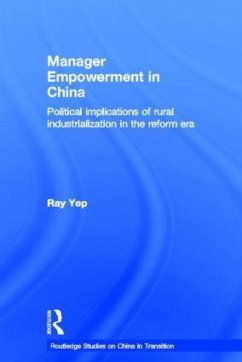Ray Yep
Manager Empowerment in China
Political Implications of Rural Industrialisation in the Reform Era
Ray Yep
Manager Empowerment in China
Political Implications of Rural Industrialisation in the Reform Era
- Gebundenes Buch
- Merkliste
- Auf die Merkliste
- Bewerten Bewerten
- Teilen
- Produkt teilen
- Produkterinnerung
- Produkterinnerung
Manager Empowerment in China provides an analysis of the new state-society relationship in China and demonstrates the complexity and fluidity involved in institutional development and market transformation.
Andere Kunden interessierten sich auch für
![Industrial Relations in Japan Industrial Relations in Japan]() Norma ChalmersIndustrial Relations in Japan206,99 €
Norma ChalmersIndustrial Relations in Japan206,99 €![The Nonprofit Human Resource Management Handbook The Nonprofit Human Resource Management Handbook]() The Nonprofit Human Resource Management Handbook109,99 €
The Nonprofit Human Resource Management Handbook109,99 €![Japanese Labour and Management in Transition Japanese Labour and Management in Transition]() Japanese Labour and Management in Transition143,99 €
Japanese Labour and Management in Transition143,99 €![Asian Regional Governance Asian Regional Governance]() Kanishka JayasuriyaAsian Regional Governance191,99 €
Kanishka JayasuriyaAsian Regional Governance191,99 €![Globalisation, State and Labour Globalisation, State and Labour]() Peter Fairbrother / Al Rainnie (eds.)Globalisation, State and Labour202,99 €
Peter Fairbrother / Al Rainnie (eds.)Globalisation, State and Labour202,99 €![Global Unions? Global Unions?]() Jeffrey Harrod / Robert O'Brien (eds.)Global Unions?202,99 €
Jeffrey Harrod / Robert O'Brien (eds.)Global Unions?202,99 €![Human Resources, Care Giving, Career Progression and Gender Human Resources, Care Giving, Career Progression and Gender]() Editor)Human Resources, Care Giving, Career Progression and Gender132,99 €
Editor)Human Resources, Care Giving, Career Progression and Gender132,99 €-
-
-
Manager Empowerment in China provides an analysis of the new state-society relationship in China and demonstrates the complexity and fluidity involved in institutional development and market transformation.
Hinweis: Dieser Artikel kann nur an eine deutsche Lieferadresse ausgeliefert werden.
Hinweis: Dieser Artikel kann nur an eine deutsche Lieferadresse ausgeliefert werden.
Produktdetails
- Produktdetails
- Verlag: Taylor & Francis
- Seitenzahl: 256
- Erscheinungstermin: 13. März 2003
- Englisch
- Abmessung: 240mm x 162mm x 20mm
- Gewicht: 513g
- ISBN-13: 9780415282956
- ISBN-10: 0415282950
- Artikelnr.: 20990058
- Herstellerkennzeichnung
- Libri GmbH
- Europaallee 1
- 36244 Bad Hersfeld
- gpsr@libri.de
- Verlag: Taylor & Francis
- Seitenzahl: 256
- Erscheinungstermin: 13. März 2003
- Englisch
- Abmessung: 240mm x 162mm x 20mm
- Gewicht: 513g
- ISBN-13: 9780415282956
- ISBN-10: 0415282950
- Artikelnr.: 20990058
- Herstellerkennzeichnung
- Libri GmbH
- Europaallee 1
- 36244 Bad Hersfeld
- gpsr@libri.de
Dr. Ray Yep is Assistant Professor in the Department of Public and Social Administration at City University Hong Kong.
Part 1 1. Introduction 2. Implications of Understanding Rural
Transformation 3. Defining Key Terms 4. Chinese State Meets Social
Scientists 5. Research Focus: State-Manager Relations In Rural China 6.
Leaping Forward TVE Development in the 1990s 7. The Analytical Strategy 8.
Contextualizing Zibo 8. Key Arguments 9. Structure of the Book Part 2 10.
Continuities and Discontinuities of Rural Transformation 11. Changes in
Institutional Setting 12. New Challenges for Rural Governance 13.
Development of Rural Enterprises as a Response to Challenges 14.
Institutional Legacies of Mao's Economy 15. Zibo on the Eve of Reform Part
3 16. The Rise of Enterprise Managers in Rural China 17. TVE Managers:
Entrepreneurs Without Ownership 18. The Importance of Human Capital 19. TVE
Managers on the Road to Political Power 20. Summary Part 4 21. Where Local
Government Still Matters for Business Transaction 22. The Parochialism of
TVE Development 23. General Infrastructureal Support of Local Government
24. Securing Capital Supply 25. Business Networking 26. A Different
Universe for Key Enterprises 27. Summary Part 5 28. Accommodating Managers'
Autonomy in Enterprise Operation 29. Motivating the Involvement of Local
Government 30. Benchmarking Enterprise Performance 31. Allocating
Enterprise Resources 32. Control of Staffing Decision 33. Summary Part 6
34. Evaluating Enterprise Reform: A Local Perspective 35. A Brief Review of
Enterprise Reforms in Post-Mao China 36. Indecisiveness of the Central
Government 37. Relevance for the Rural Economy 38. Calculations of the
Enterprise Managers Part 7 39. Managers Chasing In: Shareholding Reform in
Rural China 40. Shareholding Cooperative System: Background and Development
41. Dividing the Cake: A Balancing Act 42. Reform Intensification the
Mid-1990s 43. Summary Part 8 43. Conclusion 44. History Matters 45. Towards
a Synergistic Perspective 46. Vulnerability of Local Collaboration 47.
Concluding Remarks
Transformation 3. Defining Key Terms 4. Chinese State Meets Social
Scientists 5. Research Focus: State-Manager Relations In Rural China 6.
Leaping Forward TVE Development in the 1990s 7. The Analytical Strategy 8.
Contextualizing Zibo 8. Key Arguments 9. Structure of the Book Part 2 10.
Continuities and Discontinuities of Rural Transformation 11. Changes in
Institutional Setting 12. New Challenges for Rural Governance 13.
Development of Rural Enterprises as a Response to Challenges 14.
Institutional Legacies of Mao's Economy 15. Zibo on the Eve of Reform Part
3 16. The Rise of Enterprise Managers in Rural China 17. TVE Managers:
Entrepreneurs Without Ownership 18. The Importance of Human Capital 19. TVE
Managers on the Road to Political Power 20. Summary Part 4 21. Where Local
Government Still Matters for Business Transaction 22. The Parochialism of
TVE Development 23. General Infrastructureal Support of Local Government
24. Securing Capital Supply 25. Business Networking 26. A Different
Universe for Key Enterprises 27. Summary Part 5 28. Accommodating Managers'
Autonomy in Enterprise Operation 29. Motivating the Involvement of Local
Government 30. Benchmarking Enterprise Performance 31. Allocating
Enterprise Resources 32. Control of Staffing Decision 33. Summary Part 6
34. Evaluating Enterprise Reform: A Local Perspective 35. A Brief Review of
Enterprise Reforms in Post-Mao China 36. Indecisiveness of the Central
Government 37. Relevance for the Rural Economy 38. Calculations of the
Enterprise Managers Part 7 39. Managers Chasing In: Shareholding Reform in
Rural China 40. Shareholding Cooperative System: Background and Development
41. Dividing the Cake: A Balancing Act 42. Reform Intensification the
Mid-1990s 43. Summary Part 8 43. Conclusion 44. History Matters 45. Towards
a Synergistic Perspective 46. Vulnerability of Local Collaboration 47.
Concluding Remarks
Part 1 1. Introduction 2. Implications of Understanding Rural
Transformation 3. Defining Key Terms 4. Chinese State Meets Social
Scientists 5. Research Focus: State-Manager Relations In Rural China 6.
Leaping Forward TVE Development in the 1990s 7. The Analytical Strategy 8.
Contextualizing Zibo 8. Key Arguments 9. Structure of the Book Part 2 10.
Continuities and Discontinuities of Rural Transformation 11. Changes in
Institutional Setting 12. New Challenges for Rural Governance 13.
Development of Rural Enterprises as a Response to Challenges 14.
Institutional Legacies of Mao's Economy 15. Zibo on the Eve of Reform Part
3 16. The Rise of Enterprise Managers in Rural China 17. TVE Managers:
Entrepreneurs Without Ownership 18. The Importance of Human Capital 19. TVE
Managers on the Road to Political Power 20. Summary Part 4 21. Where Local
Government Still Matters for Business Transaction 22. The Parochialism of
TVE Development 23. General Infrastructureal Support of Local Government
24. Securing Capital Supply 25. Business Networking 26. A Different
Universe for Key Enterprises 27. Summary Part 5 28. Accommodating Managers'
Autonomy in Enterprise Operation 29. Motivating the Involvement of Local
Government 30. Benchmarking Enterprise Performance 31. Allocating
Enterprise Resources 32. Control of Staffing Decision 33. Summary Part 6
34. Evaluating Enterprise Reform: A Local Perspective 35. A Brief Review of
Enterprise Reforms in Post-Mao China 36. Indecisiveness of the Central
Government 37. Relevance for the Rural Economy 38. Calculations of the
Enterprise Managers Part 7 39. Managers Chasing In: Shareholding Reform in
Rural China 40. Shareholding Cooperative System: Background and Development
41. Dividing the Cake: A Balancing Act 42. Reform Intensification the
Mid-1990s 43. Summary Part 8 43. Conclusion 44. History Matters 45. Towards
a Synergistic Perspective 46. Vulnerability of Local Collaboration 47.
Concluding Remarks
Transformation 3. Defining Key Terms 4. Chinese State Meets Social
Scientists 5. Research Focus: State-Manager Relations In Rural China 6.
Leaping Forward TVE Development in the 1990s 7. The Analytical Strategy 8.
Contextualizing Zibo 8. Key Arguments 9. Structure of the Book Part 2 10.
Continuities and Discontinuities of Rural Transformation 11. Changes in
Institutional Setting 12. New Challenges for Rural Governance 13.
Development of Rural Enterprises as a Response to Challenges 14.
Institutional Legacies of Mao's Economy 15. Zibo on the Eve of Reform Part
3 16. The Rise of Enterprise Managers in Rural China 17. TVE Managers:
Entrepreneurs Without Ownership 18. The Importance of Human Capital 19. TVE
Managers on the Road to Political Power 20. Summary Part 4 21. Where Local
Government Still Matters for Business Transaction 22. The Parochialism of
TVE Development 23. General Infrastructureal Support of Local Government
24. Securing Capital Supply 25. Business Networking 26. A Different
Universe for Key Enterprises 27. Summary Part 5 28. Accommodating Managers'
Autonomy in Enterprise Operation 29. Motivating the Involvement of Local
Government 30. Benchmarking Enterprise Performance 31. Allocating
Enterprise Resources 32. Control of Staffing Decision 33. Summary Part 6
34. Evaluating Enterprise Reform: A Local Perspective 35. A Brief Review of
Enterprise Reforms in Post-Mao China 36. Indecisiveness of the Central
Government 37. Relevance for the Rural Economy 38. Calculations of the
Enterprise Managers Part 7 39. Managers Chasing In: Shareholding Reform in
Rural China 40. Shareholding Cooperative System: Background and Development
41. Dividing the Cake: A Balancing Act 42. Reform Intensification the
Mid-1990s 43. Summary Part 8 43. Conclusion 44. History Matters 45. Towards
a Synergistic Perspective 46. Vulnerability of Local Collaboration 47.
Concluding Remarks








